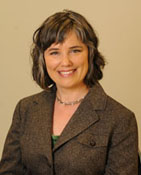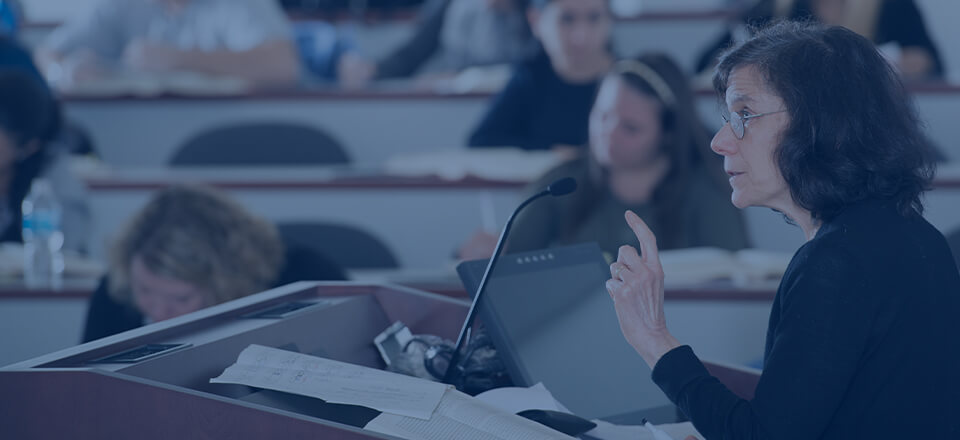About

Touro Law Launches New Institute on Land Use & Sustainable Development Law
Professor Sarah Adams-Schoen Named Inaugural Director
September 17, 2013Touro Law Center Dean Patricia Salkin announced the launch of a new Institute on Land Use and Sustainable Development Law at Touro Law Center, and the appointment of Professor Sarah Adams-Schoen as the inaugural director.
In making the announcement, Dean Salkin explained, “Since being recruited to Touro Law Center I have been encouraged by many to bring my passion for land use and sustainable development law to benefit the students and alumni of Touro Law as well as the Long Island community. The bulk of the routine land use litigation in New York State arises from the Second Department which covers Long Island, not surprising," Dean Salkin notes, "since there are 110 units of local government that engage in the land use regulation game and the value of real estate makes these decisions high stakes for property owners and impacted neighbors.”
The Institute has received generous funding from well-known Long Island developer Frank Castagna of Castagna Realty, and from the CAMBR Foundation, a long-time supporter of the Law Center. An Advisory Board has been established for the Institute, including the following members: A. Thomas Levin and Richard Eisenberg of Meyer, Suozzi, English and Klein, P.C., Anthony Guardino and Erin Sidaras of Farrell Fritz, P.C., Jonathan Sinnreich of Sinnreich Kosakoff, Maureen Liccione of Jaspan Schlesinger LLP, Linda Margolin of Bracken Margolin and Besunder, LLP, and Judge Leon Lazer. A Committee of faculty affiliates, including Professors Joan Foley, Michael Lewyn, Ann Nowak, Benjamin Rajotte and Pat Rooney, is also working with the Board. Dean Salkin and Assistant Dean Linda Weissman serve as ex-officio members of the Board. Mr. Eisenberg has been named Chairman. He stated, “The new Advisory Board includes accomplished practitioners as well as outstanding Law Center faculty. Judge Lazer, the longtime leader of these efforts at the Law Center, continues as a valued member of the Advisory Board. My colleagues and I look forward to providing policy guidance and practical assistance to the Institute.”
After a national search that drew applicants from California, Florida, Mississippi and across New York State, Dean Salkin selected Professor Sarah Adams-Schoen, who teaches, among other things, Environmental Criminal Law at Touro Law Center, to serve as the Director. Prior to joining the Touro Law Center faculty, Adams-Schoen was a Visiting Professor of Legal Analysis and Writing at Lewis & Clark Law School in Portland, Oregon, where she also taught Energy Law and Federal White Collar Criminal Law. She received a Master’s in Public Policy and Public Administration with distinction from the London School of Economics, where she focused on urban planning. Adams-Schoen worked as a senior policy analyst for Portland, Oregon’s Metro Regional Government, a tri-county governmental body world-renowned for its comprehensive approach to growth management and sustainability. Upon receiving her J.D. magna cum laude from Lewis & Clark Law School, Adams-Schoen worked as a civil and regulatory litigator at Stoel Rives, a 400-attorney firm in the Northwest, gaining environmental, energy, regulatory, and administrative law experience. She later helped start the nationally-ranked energy law firm, McDowell, Rackner & Gibson, where she continued to represent energy clients in litigation, regulatory proceedings, and before the legislature. Adams-Schoen has written and presented on a diverse range of topics, including the constitutional rights of corporations implicated by environmental inspections, the economics of climate change and the role of peripheral actors in urban planning. She currently serves as co-editor-in-chief of Municipal Lawyer, a publication of the New York State Bar Association’s Municipal Law Section.
Professor Adams-Schoen stated, “I am thrilled at this opportunity to contribute to a Long Island that is both economically and environmentally sustainable, while providing our talented Touro Law Center students with more opportunities to serve their local communities and develop their skills as lawyers. The Institute on Land Use and Sustainable Development Law, in partnership with the planning, development, and environmental communities of Long Island, will foster greater understanding of local land use law, environmental law and public policy by providing a forum for discussion and resources such as model laws, best practice commentaries, and training and education for lawyers and the larger community. As I embark on this new chapter at Touro Law Center, I am honored to follow in the footsteps of Judge Leon Lazer, who directed Touro Law’s original Land Use and Public Policy Institute.”
In making the announcement, Dean Salkin explained, “Since being recruited to Touro Law Center I have been encouraged by many to bring my passion for land use and sustainable development law to benefit the students and alumni of Touro Law as well as the Long Island community. The bulk of the routine land use litigation in New York State arises from the Second Department which covers Long Island, not surprising," Dean Salkin notes, "since there are 110 units of local government that engage in the land use regulation game and the value of real estate makes these decisions high stakes for property owners and impacted neighbors.”
The Institute has received generous funding from well-known Long Island developer Frank Castagna of Castagna Realty, and from the CAMBR Foundation, a long-time supporter of the Law Center. An Advisory Board has been established for the Institute, including the following members: A. Thomas Levin and Richard Eisenberg of Meyer, Suozzi, English and Klein, P.C., Anthony Guardino and Erin Sidaras of Farrell Fritz, P.C., Jonathan Sinnreich of Sinnreich Kosakoff, Maureen Liccione of Jaspan Schlesinger LLP, Linda Margolin of Bracken Margolin and Besunder, LLP, and Judge Leon Lazer. A Committee of faculty affiliates, including Professors Joan Foley, Michael Lewyn, Ann Nowak, Benjamin Rajotte and Pat Rooney, is also working with the Board. Dean Salkin and Assistant Dean Linda Weissman serve as ex-officio members of the Board. Mr. Eisenberg has been named Chairman. He stated, “The new Advisory Board includes accomplished practitioners as well as outstanding Law Center faculty. Judge Lazer, the longtime leader of these efforts at the Law Center, continues as a valued member of the Advisory Board. My colleagues and I look forward to providing policy guidance and practical assistance to the Institute.”
After a national search that drew applicants from California, Florida, Mississippi and across New York State, Dean Salkin selected Professor Sarah Adams-Schoen, who teaches, among other things, Environmental Criminal Law at Touro Law Center, to serve as the Director. Prior to joining the Touro Law Center faculty, Adams-Schoen was a Visiting Professor of Legal Analysis and Writing at Lewis & Clark Law School in Portland, Oregon, where she also taught Energy Law and Federal White Collar Criminal Law. She received a Master’s in Public Policy and Public Administration with distinction from the London School of Economics, where she focused on urban planning. Adams-Schoen worked as a senior policy analyst for Portland, Oregon’s Metro Regional Government, a tri-county governmental body world-renowned for its comprehensive approach to growth management and sustainability. Upon receiving her J.D. magna cum laude from Lewis & Clark Law School, Adams-Schoen worked as a civil and regulatory litigator at Stoel Rives, a 400-attorney firm in the Northwest, gaining environmental, energy, regulatory, and administrative law experience. She later helped start the nationally-ranked energy law firm, McDowell, Rackner & Gibson, where she continued to represent energy clients in litigation, regulatory proceedings, and before the legislature. Adams-Schoen has written and presented on a diverse range of topics, including the constitutional rights of corporations implicated by environmental inspections, the economics of climate change and the role of peripheral actors in urban planning. She currently serves as co-editor-in-chief of Municipal Lawyer, a publication of the New York State Bar Association’s Municipal Law Section.
Professor Adams-Schoen stated, “I am thrilled at this opportunity to contribute to a Long Island that is both economically and environmentally sustainable, while providing our talented Touro Law Center students with more opportunities to serve their local communities and develop their skills as lawyers. The Institute on Land Use and Sustainable Development Law, in partnership with the planning, development, and environmental communities of Long Island, will foster greater understanding of local land use law, environmental law and public policy by providing a forum for discussion and resources such as model laws, best practice commentaries, and training and education for lawyers and the larger community. As I embark on this new chapter at Touro Law Center, I am honored to follow in the footsteps of Judge Leon Lazer, who directed Touro Law’s original Land Use and Public Policy Institute.”
XXX
Touro College Jacob D. Fuchsberg Law Center’s 185,000-square-foot, state-of-the-art facility is located adjacent to both a state and a federal courthouse in Central Islip, New York. Touro Law’s proximity to the courthouses, coupled with programming developed to integrate the courtroom into the classroom, provide a one-of-a kind learning model for law students, combining a rigorous curriculum taught by expert faculty with a practical courtroom experience. Touro Law, which has a student body of approximately 750 and an alumni base of more than 5,000, offers full- and part-time J.D. programs, several dual degree programs and graduate law programs for US and foreign law graduates. Touro Law Center is part of the Touro College system.
About the Touro College and University System
Touro is a system of non-profit institutions of higher and professional education. Touro College was chartered in 1970 primarily to enrich the Jewish heritage, and to serve the larger American and global community. Approximately 19,000 students are currently enrolled in its various schools and divisions. Touro College has branch campuses, locations and instructional sites in the New York area, as well as branch campuses and programs in Berlin, Jerusalem, Moscow, Paris and Florida. New York Medical College, Touro University California and its Nevada branch campus, as well as Touro University Worldwide and its Touro College Los Angeles division are separately accredited institutions within the Touro College and University System. For further information on Touro College, please go to: http://www.touro.edu/media/.
Patti Desrochers
Director of Communications
pattid@tourolaw.edu
(631) 761-7062

